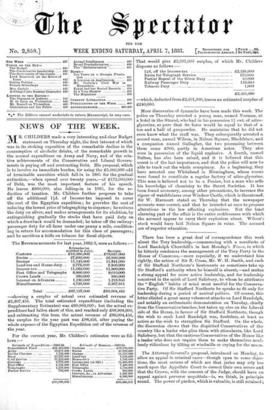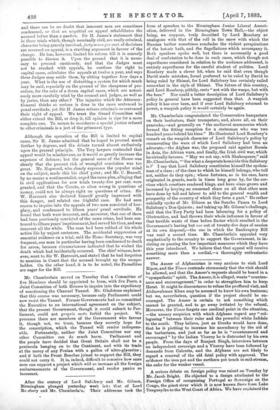The Attorney-General's proposal, introduced on Monday, to allow an appeal
in criminal cases—though open to some objec- tions, the most serious of which are that juries may rely too much upon the Appellate Court to correct their own errors and that the Crown, with the consent of the Judge, should have an appeal against perverse acquittals—is, we think, in principle sound. The power of pardon, which is valuable, is still, retained ;
and there can be no doubt that innocent men are sometimes condemned, or that an acquittal on appeal rehabilitates the accused better than a pardon. Sir H. James's statement that in those trials which, though nominally civil, are really criminal, character being gravely involved, forty-seven per cent. of decisions are reversed on appeal, is a startling argument in favour of the change. He has, however, limited his reform till it is scarcely possible to discuss it. Upon the ground that it is neces- sary to proceed cautiously, and that the Judges must not be crushed with appeals, he confines the right to capital cases, calculates the appeals at twelve a year, and says three Judges may settle them, by sitting together four days a year. What is the use of disturbing a system for which much may be said, especially on the ground of the cheapness of pro- cedure, for the sake of a dozen capital cases, which are notori- ously more carefully tried by the counsel and judges, as well as by juries, than any other ? The injustice which the Attorney- General thinks so serious is done in the cases sentenced to penal servitude, yet Sir H James refuses criminals so sentenced their right of appeal. We trust the Grand Committee will either extend the Bill, or drop it, till opinion is ripe for a more complete ono. To secure to murderers a special justice refused to other criminals is a jest of the grimmest type.



































